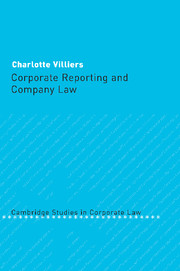Book contents
- Frontmatter
- Contents
- Preface
- Table of legislation
- Table of cases
- Introduction
- PART I GENERAL ISSUES
- 1 Disclosure theory and the limitations of corporate reports
- 2 The regulatory framework
- 3 Persons responsible for presenting corporate reports and information
- 4 Users of corporate reports
- 5 The Companies Register
- PART II FINANCIAL REPORTING
- PART III NARRATIVE REPORTING
- PART IV A WAY FORWARD
- Bibliography
- Index
3 - Persons responsible for presenting corporate reports and information
Published online by Cambridge University Press: 23 July 2009
- Frontmatter
- Contents
- Preface
- Table of legislation
- Table of cases
- Introduction
- PART I GENERAL ISSUES
- 1 Disclosure theory and the limitations of corporate reports
- 2 The regulatory framework
- 3 Persons responsible for presenting corporate reports and information
- 4 Users of corporate reports
- 5 The Companies Register
- PART II FINANCIAL REPORTING
- PART III NARRATIVE REPORTING
- PART IV A WAY FORWARD
- Bibliography
- Index
Summary
Introduction
The DTI's consultation process on directors and auditors' liability underlined the importance of their role in the reporting process. Indeed, the consultation was expressly stated to be mainly about the directors' duty of care ‘both in relation to the conduct and supervision of the company's affairs, and, specifically, the preparation of its accounts’. In addition the consultation was concerned to consider the extent of the auditors' liability since they can be held liable in relation to their audit of the company's accounts. The collapse of Enron led also to the demise of the auditing firm Arthur Andersen, as well as criminal proceedings against some of the auditing firm's partners and the senior directors of the company. Other recent company disasters such as Parmalat, Ahold, Worldcom, Marconi and, most recently, MG Rover, have also resulted in the spotlight being placed on the financial accounts and those responsible for producing and verifying them.
The DTI's consultation was also concerned with getting the right solution for establishing the civil liability of directors and auditors and ‘balancing the interests of stakeholders’. The interests to be balanced, according to the DTI are:
investors, who wish to maintain the supply of competent, appropriately qualified individuals who are willing and able to lead companies; other users of accounts, who want to maintain and, where possible, enhance the quality of the audit; directors, who want to be clear about their responsibilities and liabilities; auditors, who wish to ensure that the risks and reward associated with their professional work are appropriately balanced; and regulators, who are anxious to maintain efficient, well-ordered and transparent markets.
- Type
- Chapter
- Information
- Corporate Reporting and Company Law , pp. 53 - 84Publisher: Cambridge University PressPrint publication year: 2006



